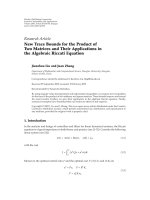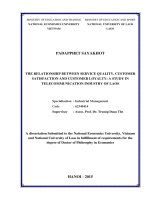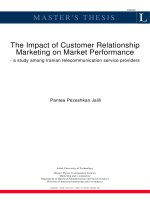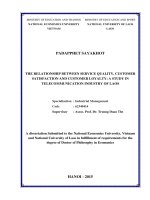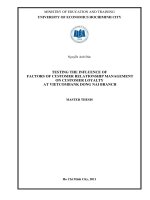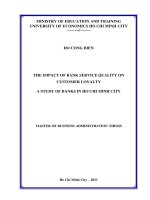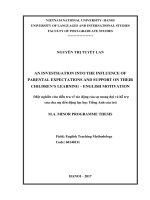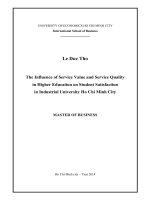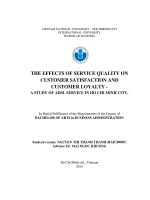The influence of relationship quality on customer loyalty a study of veterinary companies and their agencies in vietnam
Bạn đang xem bản rút gọn của tài liệu. Xem và tải ngay bản đầy đủ của tài liệu tại đây (1.02 MB, 70 trang )
UNIVERSITY OF ECONOMICS HO CHI MINH CITY
International School of Business
------------------------------
Nguyen Dac Huy
THE INFLUENCE OF RELATIONSHIP
QUALITY ON CUSTOMER LOYALTY – A
STUDY OF VETERINARY COMPANIES AND
THEIR AGENCIES IN VIETNAM
ID: 21120091
MASTER OF BUSINESS (Honours)
SUPERVISOR: Dr. PHAM NGOC THUY
Ho Chi Minh City – Year 2014
ACKNOWLEDGEMENTS
Firstly, I would like to express my sincere gratitude to Dr. Pham Ngoc Thuy, my
Supervisor, who has given me great guidance, inspiration and especially her motivation,
thanks for her valuable advice, suggestions and resources that helping me in accomplishing
this study.
Secondly, I would like to express my sincere thanks to all professors, tutors and officers of
MBus Program for valuable lectures, academy knowledge and your experiences transfer
throughout the period of courses at International School of Business.
I want to express my special thanks to all my colleagues, friends, customers in veterinary
medicine industry for your advice, cooperation and supports during the pilot and official
survey. Without your support, I could not successfully complete my thesis.
Ho Chi Minh City, Vietnam,
30th Sep, 2014.
Nguyen Dac Huy
ii
ABSTRACT
In recent years, the industry of veterinary medicine in Vietnam has been developing
significantly. The veterinary medicine companies increasingly expand the market and
enlarge their agencies system to take the company's image and products to market. The
purpose of attracting customers is to gain more market-share and bring more profits back to
them. This research is to identify the determinants affecting customer loyalty in veterinary
medicine industry.
This study was aimed to explore the influence of relationship quality factors on customer
loyalty in veterinary medicine industry in southern of Vietnam is done through quantitative
methods. Formal quantitative research through interviews using a questionnaire with a
sample collected in a convenient method of 230 agencies around some provinces in
Southern.
The research results contribute to the theoretical basis of research by understanding the
meaning of the factors of relationship quality that affect consumer loyalty in veterinary
medicine market. Thereby, the results also provide managers with a basis for decisionmaking, investment options to develop new products and services in line with objectives
and current strategic.
Key words: Trust, Commitment, Satisfaction, Customer Loyalty
iii
Table of Content
Acknowledgement....................................................................................................................ii
Abstract....................................................................................................................................iii
CHAPTER 1: INTRODUCTION
..............................................................................................................................
1
1.1
Research background
.............................................................................................................................................
1
1.2
Research problem
.....................................................................................................................................................
2
1.3
Research objectives
.................................................................................................................................................
2
1.4
Research scope
..........................................................................................................................................................
2
1.5
Research structure
....................................................................................................................................................
3
CHAPTER 2: LITERATURE REVIEW
................................................................................................................
4
2.1
A brief introduction about veterinary medicine industry
............................................................................
4
2.2
Research Concepts
.................................................................................................................................................
6
2.2.1
Relationship quality
...............................................................................................................................................
6
2.2.2
Trust
..............................................................................................................................................................................
6
2.2.3
Commitment
.............................................................................................................................................................
6
2.2.4
Satisfaction
.................................................................................................................................................................
7
2.2.5
Customer Loyalty
.....................................................................................................................................................
7
2.3
Hypotheses &Research model
............................................................................................................................
7
2.3.1
Trust and customer loyalty
..................................................................................................................................
7
2.3.2
Commitment and customer loyalty
....................................................................................................................
8
2.3.3
Satisfaction and customer loyalty
.......................................................................................................................
9
2.3.4
Moderating Effect
....................................................................................................................................................
9
2.4
Research model
......................................................................................................................................................
10
CHAPTER 3: RESEARCH METHODOLOGY
..............................................................................................
11
3.1
General approach
..................................................................................................................................................
12
3.2
Research methodology, Data collection and sample size
........................................................................
13
3.2.1
Step 1: Qualitative study
.....................................................................................................................................
13
3.2.2
Measurement scale
..............................................................................................................................................
14
3.2.3
Step 2: Pilot
.............................................................................................................................................................
16
3.2.4
Step 3: Quantitative study
..................................................................................................................................
17
3.2.5
Sample size of Quantitative research
.............................................................................................................
17
3.2.6
Sampling methodology
......................................................................................................................................
18
iv
3.2.7
Questionnaire explanation
..................................................................................................................................
18
3.3.
Data analysis
..........................................................................................................................................................
19
3.3.1
Exploratory Factor Analysis (EFA)
...............................................................................................................
19
3.3.2
Reliability Analysis
..............................................................................................................................................
20
3.3.3
Multi-linear regression analysis
......................................................................................................................
21
3.4
Chapter 3 summary
.............................................................................................................................................
22
CHAPTER 4: DATA ANALYSIS, FINDINGS AND DISCUSSION
......................................................
23
4.1
Descriptive data analysis
...................................................................................................................................
23
4.1.1
Descriptive analysis of Sample charateristics
............................................................................................
23
4.1.2
Descriptive analysis of the variables studies
...............................................................................................
25
4.2
Measurement scale assessment
.........................................................................................................................
26
4.2.1
Cronbach Alpha reliability analysis
..............................................................................................................
26
4.2.2
Exploratory Factor Analysis
..............................................................................................................................
28
4.3
Hypotheses testing
................................................................................................................................................
34
4.3.1
Testing Assumption of Multiple Regressions
.............................................................................................
34
4.3.2
Evaluate and test the relevance of the model
.............................................................................................
35
4.3.3
Testing Hypotheses
..............................................................................................................................................
35
4.4
Discussion
..............................................................................................................................................................
39
4.4.1
Satisfaction and Commitment
...........................................................................................................................
39
4.4.2
Company Trust
.....................................................................................................................................................
40
4.4.3
Customer Trust
......................................................................................................................................................
41
4.5
Summary
..................................................................................................................................................................
42
CHAPTER 5: CONCLUSIONS AND IMPLICATIONS
..............................................................................
43
5.1
Research overview
................................................................................................................................................
43
5.2
Key Findings
.........................................................................................................................................................
44
5.3
Managerial Implicamtions
.................................................................................................................................
44
5.4
Limitations
..............................................................................................................................................................
46
References
...........................................................................................................................................................................
47
Appendices...............................................................................................................................52
v
List of Tables
Table 4.1: Descriptive statistics of sample …………………………...................…………….31
Table 4.2: Reliability analysis result…………………….…………...................……….…….33
Table 4.3: EFA analysis result for variables after handling …………...................……..……35
Table 4.4: Describe the correlation among variables …………………...................…...…….39
Table 4.5: Multiple regression result ...………………………………...................……...……43
Table 4.6: Hypothesis testing result ……………………………...................…………....……44
Table 4.7: Summary result of the hypotheses……………………....……….........................….46
vi
List of Figures
Figure 1: Research model ……………………………………..................……………………10
Figure 2: Research process ……...………………………………………..................……...…13
Figure 3: Research model after testing EFA ………………………....…………..................…34
Figure 4: Multiple regression result …………………………………...…………....................38
vii
CHAPTER 1: INTRODUCTION
1.1
Research background
Nowaday relationship quality is a critical success factor that influences the
competitiveness of an organization. Relationship quality is one of the important outcomes of
marketing activity.Hennig-Thurau and Alexander (1997) argued that relationship quality
represents the relationship between the firms and the customers. (p. 737 – 764). Nowadays
because of competitive environment among companies,losing customers is very costly for
companies (Athanasopoulou, 2009, p. 583-610).Researchers have concluded that there is
more times expensive to acquire new clients than to keep existing ones. So that, companies
have made efforts to developing and maintaining a long-term relationships with their
customers in order to create customer loyalty. Scant empirical research has been completed
that has examined the group environment, or the affective states within it, such as trust,
commitment, satisfaction and price as explaining the effects of relationship quality.
Vietnam is an agricultural country, so the livestock sector has a huge role in the
economy, contributing an important part in the economic development of Vietnam. During
the recent years, the industry of veterinary medicine in Vietnam has been developing
rapidly. Recent statistics show that there are now over two hundreds veterinary medicine
companies that are associated with customers systems with thousands of agencies and stores
stretching from the north to the south (Yellow pages Vietnam, 2014). Several medicine
companies, besides selling their products, are striving to attract and retain customers by
offering the best services which are strongly based on the business relationships. The
companies need to understand how they can create and deliver values in business to
business relationships beyond selling products. On the other side, customers need to
understand how to create, build and manage portfolio of supplier relationships to develop
overall return on relationships.
1.2 Research problem
This study will research the influence of relationship quality and customer loyalty
especially between veterinary medicine companies and their agencies in Vietnam. It will
focus deeply on three factors of relationship quality affect to the customer loyalty. They are:
trust, commitment, satisfaction. If yes, how do each factor influences on customer loyalty –
positive or negative?
1.3 Research objectives
The objectives of this research are to:
-
Identify factors of relationship quality impacting on customer loyalty between the
veterinary medicine companies and their agencies in Vietnam veterinary medicine
industry.
-
Measure the impact levels of three factors of relationship quality namely trust,
commitment, satisfaction on customer loyalty,
-
Analyze the differences of those relationships between groups of duration of
cooperation and number of partners.
1.4 Research scope
The unit analysis in this research is organization so this research was investigated on
the owners and director of the veterinary agencies.
2
In terms of geography, this research carried out from Hue to Ca Mau province. The period
of conducting the survey was last from 10 June, 2014 to early July, 2014.
1.5 Research structure
The research consists of five parts:
-
Chapter I: Introduction. This chapter introduces the research background, management
problem, research problem, research objectives, research significance, and research
scope as well as research structure.
-
Chapter II: Literature review. This chapter reviews previous related theories and
research, as well as to select the research’s factors and formulate the research
hypotheses and model.
-
Chapter III: Research methodology. This chapter provides general method how the
research is designed and implemented.
-
Chapter IV: Data analysis and findings. This chapter will translate primary data
collected from survey, analyze data as well as discuss the result findings in connection
with literature review.
-
Chapter V: Conclusion, implication, limitation and future research. This chapter will
conclude the research finding, provide research implication and give the further
suggestion as well as research limitation.
3
CHAPTER 2: LITERATURE REVIEW
This chapter presents reviews of relevant literature related to factors of relationship
quality and customer quality. Throughout this chapter, variables will be established and
grouped into relevant factors. This chapter also mentions some previous studies and
experiences related to the research topic
2.1 A brief introduction about veterinary medicine industry
The livestock sector is a key sector in the Agriculture in particularly and in the
economy generally in Vietnam. The development also brought the improvement in the
veterinary drug manufacturing which played an important role in maintain sustainably of
livestock. In order to serve to the needs of farmers and farms, the companies which produce
veterinary medicine was born in turns. In parallel with the development of veterinary
medicine companies is the appearance and development of agencies system. The veterinary
agencies are the customers of veterinary medicine companies. The agency will distribute
and sell products from the company farmers and farms which are the ultimate consumers. In
order to expand market share and increase total revenue, veterinary medicine companies are
now built and developed their system of agents across the country Vietnam. Base on that,
now more farmers have been using drugs from medicine companies Veterinary Vietnam.
Besides, in order to cater to the diverse needs of farmers, veterinary agencies and store are
distributed and sold products from many different companies. Each agency can be a
customer of 2 or 3 or more companies. Thus consumers can select and use the most suitable
products for themselves while the agencies can increase sales by doing business with many
different companies. With the fierce competition in the market today, the veterinary
4
medicine companies offer best policies for agencies in order to create and build up the good
relationship with their agencies. For these companies, customer loyalty is the most priority
concern and important issue.
On the veterinary market, the company has established a long time ago, in ten years
and the agencies have the same. There are many agencies who have worked closely with the
company since the company first established. To build loyalty from such agents, companies
must have a good relationship with the agencies, must take care and have good incentives to
help them develop in long term. The development of agency and relationship between
agency and veterinary medicine company growing higher, the company will develop in
strength.
Each company has different business lines, different methods to attract customers.
Each agency has different ways to select business partners. So there should be a lot of
factors that affect customer loyalty, which highlights the three factors:
Trust: customers must trust the company, have confidence in the business policies and
guidelines of the company activities. If the company wants to create the trust of customers,
the company's products have to meet the needs of consumers, veterinary drugs which are
manufactured from veterinary medicine have to be effective in the prevention and treatment
of diseases in livestocks and aquaculture
Commitment: customers have good reviews about the company, the products of the
company. Besides, consumers also rated the company through product quality and image of
the company which was brought to them.
5
Satisfaction: Company to attract customers, the customer must satisfy, fulfill the
requests from customers. Company’s product must be efficient, have a positive effect on the
animal.
2.2
Research Concepts
2.2.1 Relationship quality
In the past, a number of authors (e.g. Dwyer and Sejo, 1987; Moorman, Gerald and
Rohit, 1992) found that relationship quality was the association of trust, commitment and
satisfaction. These authors discussed and applied their concept in several contexts, research
projects and lead to the agreement that the concept of relationship quality is the summarize
construct of several different but related factors such as trust, commitment, satisfaction .
Therefore, this study proposes that relationship quality is combination of three components,
which are: trust, commitment and satisfaction.
2.2.2 Trust
Trust enables cooperative human endeavors (Fukuyama, 1996) and is vital to inter
organizational relationships (Gambetta, 1988; Rousseau et al., 1998). According to
Friedman, Kahn and Howe (2000) people naturally trust people, more so than technology.
Trust is also seen as an expression of confidence in an organizational environment. This
leads to cooperative behavior among individuals and groups within and between
organizations (Nandhakumar and Baskerville, 2006).
2.2.3 Commitment
There are various ideas expressed for the definition of the “commitment” concept
suggested by researchers. According to Morgan and Hunt (1994), commitment stems from
6
trust, shared values and the belief that it will be difficult to find partners that can offer the
same value. Commitment encourages partners to collaborate in order to preserve
investments in the relationship.
2.2.4 Satisfaction
Customer satisfaction is the degree to which a business’s product or service performance
matches up to the expectation of the customer. If the performance matches or exceeds the
expectations, then the customer is satisfied, if performance is below par then the customer is
dissatisfied (Roberts-Lombard, 2009). Satisfaction is a customer’s emotion when estimate
the difference between expectations about the service and the receiving from actual
performance.
2.2.5 Customer Loyalty
According to Rauyruen, Kenneth and Nigel (2007), there are three main streams of research
in loyalty: behavioral loyalty, attitudinal loyalty and composite loyalty. In the few decades
ago, Tucker (1964) argued that behavior completely accounts for loyalty. Loyalty in this
behavioral manner is believed to be stochastic not deterministic (Uncles and Gilles, 1997).
On the other hand, attitudinal concepts can be identified as providing positive word of
mouth (e.g. Zeithaml, Leonard and Parasuraman, 1996). This study follows all of the above
definition to fully explain the concept and the affect of relationship quality components.
2.3
Hypotheses & Research model
2.3.1 Trust and customer loyalty
According to Aydin and Ozer (2005); Du Plessis (2010), trust as an element of
customer loyalty has an influence on building customer loyalty. Trust is also an important
7
factor in affecting customer loyalty. When a customer trusts a business or brand, that
customer is to develop a positive intention toward to the business or brand and they willing
to form a positive buying intention towards the business.
Past research has shown increased trust is cited as critical for relationship success
between the customer and the business (Huang and Chiu, 2006). The development of trust is
effective relationship between both sides in the relationship. A customer will desire and
maintain a relationship with a business if he finds the benefits received to exceed the effort
in obtaining benefits. Therefore, a high degree of trust may lead to increase the relationship
with customer and then increase the customer loyalty in Vietnam veterinary medicine
industry.
H1: Trust has a positive impact on customer loyalty.
2.3.2 Commitment and customer loyalty
A high level of commitment provides the circumstance in which both parties can
achieve individual and mutual targets without fearing of opportunist behavior because more
committed partners will take control and balance short-term problems with long-term goal
achievement. Higher levels of commitment are expected with relationship success (Cai and
Wheale, 2004). Customers who are committed to a relationship might have a greater
propensity to act because of their need to remain consistent with their commitment (Liang
and Wang, 2005, p.66). More committed customers tend to form a positive overall
impression of the total duration of the relationship, including different transactions, positive
and negative, and these customers exhibit strong intentions to stay in the relationship (Du
8
Plessis, 2010). All of these statements indicate the relationship of commitment between
firms and customers in veterinary industry. Accordingly, our second hypothesis states:
H2: Commitment has a positive impact on customer loyalty.
2.3.3 Satisfaction and customer loyalty
According to Salami (2005) the perception of performance is gained through the
physical interaction with the business and the product and services of the business. The
customer first expectations based on needs, values, past experiences and appearance outside
of the product. The perceived quality is based on those first expectations, and the choice
that the customer made is then evaluated to determine satisfaction (Grounaris, Tzempelikos
and Chatzipanagiotou, 2007). Finally, according to Rootman (2006), if a customer feels that
he has a satisfying relationship with the business, he may perceive the business to have a
high level of service. Therefore, high levels of service quality may lead to increased
customer loyalty.
H3: Satisfaction has a positive impact on customer loyalty.
2.3.4 Moderating Effect
To increase confidence in the results, this study further examination of core
demographic variables including the duration of cooperation and the number of partners of
each agency with the veterinary medicine company.
Duration, which is defined as the length of time that the relationship between
exchange partners has existed (Doney and Cannon, 1997). In the market of veterinary in
Vietnam, each company has its own system agencies and also the agencies collaborate with
many different companies. That leads to each company and agency have different duration
9
of cooperation as well as the agency has the relationships with multiple partners. Therefore
the difference of the duration of cooperative and the number of partners has made different
influences on customer loyalty from relationship quality between companies and agencies in
Vietnam veterinary medicine industry. With the duration as long-term partnership, the
relationship between companies and their agencies is strong and sustainable. Beside that,
having the more number of partners will reflect the good development of agency in the
market.
2.4 Research model
RELATIONSHIP
QUALITY
TRUST
H1
CUSTOMER
LOYALTY
H2
COMMITMENT
H3
SATISFACTION
Figure 1: Research model
2.5
Chapter 2 summary
In this study, there are four contructs used in research model. Trust, Commitment,
Satisfaction was hypothesized to positive impact of Customer Loyalty.
The following chapters will present how we develop measurement scales for each
10
constructs in the research model. The research methodology and data analysis procedure
before having conclusions for the results of each hypothesis with empirical data.
11
CHAPTER 3: RESEARCH METHODOLOGY
This chapter provides information related to the method applied to test the hypotheses.
The chapter includes five parts: general approach, research methodology, measurement
scale, questionnaire explanation, data collection and sample size, and data analysis.
3.1 Research Process
Step 1: This research topic with objectives was formulated.
Step 2: Literature review and theories about the relationship quality and customer loyalty
was reviewed.
Step 3: The, a research hypothesis was developed.
Step 4: A research model was formulated.
Step 5: The questionnaire was developed and the sampling methodology was decided to
ensure the objectives met.
Step 6: The questionnaire was used to interview relevant respondent.
Step 7: After completing the interview step, data was analysed and test the hypothesis and
start writing the report.
Step 8: Summarize the findings and come up with recommendation.
12
Identify problem
statement and
research objectives
Develop
questionnaire &
sampling procedures
Literature review for
conceptual
frameworks to be
applied
Develop research
hypotheses
Conducting the
research
Testing the
hypotheses
Build the research
model
Findings &
recommendations
Figure 2: Research process
3.2 Research methodology, collecting data and sample size
Within step 5 and step 6 above mentioned, this research phase was conducted through
two phases named the qualitative and quantitative survey in the southern of Vietnam. The
objective of qualitative is to explore and clarify the factors of relationship quality affecting
on customer loyalty in veterinary medicine industry which was raised by previous
reseachers and adjust to be more suitable to Vietnam situation. After that, quantitative
research was conducted based on the findings from quantitative phase was specified in the
below parts.
3.2.1 Step 1: Qualitative study
Before researching on a bi scale, a small group of customers will be invited for one on
one interview, objective of this phase is to identify the impact factors on customer loyalty
by initially validating the factors proved by previous researchers and explore new factors in
Vietnam industry. In this thesis, qualitative research was conducts by group of 10
respondents through which key insights, deep-dive information about customer loyalty will
13
be explore. In this step, 10 respondents who are the managers and owners of veterinary
medicine agencies were interviewed.
3.2.2 Measurement scale
The original measurement scale from previous studies was used in Qualitative stage to
test their validity. After listening to customers’
feedbacks, the scales for study were
modified.
3.2.2.1 Trust
Measurement of Trust was based on the Anderson and Narus (1986) scale. Trust scale
items for this study are symbolized by TRUST with Likert scale ranging from 1
(Totally disagree) to 5 (Totally agree)
Statement
Coding
The agency is concerned about company welfare
TRUST01
The agency considers how its actions will affect customers and
TRUST02
company
Your agency trusts in the service of company
TRUST03
Company is well-known for fair dealings
TRUST04
Company is very dependable, especially about important things
TRUST05
Although times change and the future may be somewhat uncertain,
TRUST06
company will support agency
Company is a faithful business partner
TRUST07
The agency is secure in dealing with new business situations because
TRUST09
company will support agency.
14
3.2.2.2 Commitment
Measurement of Commitment was also based on the Anderson and Narus (1986)
scales. Commitment was measured by four items.Commitment scale items for this study are
symbolized by COMMI
Statement
Coding
The agency is committed to the preservation of good working
COMMI14
relationships with company
The agency believes in company as partners.
COMMI15
The agency expect to have long term relationship with company.
COMMI17
3.2.2.3 Satisfaction
Satisfaction was measured using six items which were adapted from Wrestbrook
(1980) scales. Satisfaction scale items for this study are symbolized by SATIS, such as:
Statement
Coding
This experience of products and services of this company is exactly
SATIS19
what I need.
My choice was a wise one.
SATIS20
If I could do it over again, I would choose products and services of
SATIS21
company.
This experience of products and services from this company has
SATIS22
worked out as well as I thought it would.
I’m sure it was the right thing for me to use products and service of
SATIS23
this company.
3.2.2.4 Customer Loyalty
In the veterinary industry, customer loyalty was measured using the seven items based
on the Luarn and Lin (2013) scales. Customer Loyalty scale items for this study are
symbolized by LOYAL.
15
Statement
Coding
I will transact with company again for future needs.
LOYAL24
I will recommend other people to cooperate with company
LOYAL25
I will say positive things to other people about the products and
LOYAL26
services provided by company.
I will continue to cooperate with company even if the service charges
LOYAL27
are increased moderately.
I have strong preference to company
LOYAL28
I will keep cooperating with company regardless of everything being
LOYAL29
changed somewhat
I am likely to pay a little bit more for using the products and services
LOYAL30
of company
The measurement scale for this study will be based on Likert scale ranging from 1 (totally
disagree) to 5 (totally agree).
(1): Totally disagree
(2): Disagree
(3): Neutral
(4): Agree
(5): Totally Agree
3.2.3 Step 2: Pilot
Pilot before quantitative research was conducted on five Vietnamese customer to finetune
some wordings and ensure statements are easy to understand and use layman language.
After this pilot, there are no changes in the key content of the questionnaire as most
customers feedbacked the questionnaire as easy to understand. After the pilot conducted and
the adjusted questionnaire, the research moved to next step.
16
3.2.4 Step 3: Quantitative study
The quantitative questionnaire in thesis was developed basing on both applying the
theoretical background as well as the modified measurement items from qualitative
researches as stated. The research used five-point Likert scale with 1 mean “Strongly
disagree” to 5 means “Strongly agree”. In addition, before the full fieldwork for
quantitative, a pilot test was conducted on 10 respondents to check if all the questions are
clearly stated. Re-wording has been made accordingly. After adjusting the questionnaire
based on the feedbacks, the final quantitative questionnaire is presented in Appendix 1 (
English version) and Appendix 2 (Vietnamese version).
3.2.5 Sample size of Quantitative research
This research was conducted on a sample of 230 respondents conveniently selected.
Among those, only 207 ones meet the criteria respondents to answer the full questionnaire,
therefore, the final sample size used for the analysis is 207 respondents. A qualified
respondent must currently at the position of owner or manager who serves as operation and
tactical level of a veterinary medicine agency and has been in business relationship with at
least one veterinary medicine company. The sample size must satisfy the rule of thumb by
Hair et all (2010) that the sample size should be at least 5 times the number of observed
variables. It measn that the minimum size must be (=5 x 2). The current sample size
quantity met this critetion.
The critetion for respondents are:
• Males or females
• Currently live in the southern of Vietnam (from Hue to Ca Mau province).
17
• Currently at the owner or manager position as operation and tactical level of a
veterinary medicine agency.
• Must have a business relationship with at least one veterinary medicine company.
3.2.6 Sampling methodology
The target population for this survey includes the 200 to 250 veterinary medicine
agencies and stores in the Southern of Vietnam which spread from Hue to Ca Mau province.
Questionnaire will be distributed to all the agencies and the face to face interview will be
executed to the consisting of owners or directors of these agencies.
Among those
respondents, there is around 90 % of the questionnaire qualified for the analysis.
Those are unqualified including unqualified questionnaire with skipping questions or
illogical answers or conflict answer. Those non-qualified questionnaire were removed out of
the main sample.
3.2.7 Questionnaire explanation
The final questionnaire was structure into 3 main parts
• Screening: This part is to ensure the right qualified respondents selected. As the target
of the survey who currently is the manager or owner of a veterinary medicine agency
and has the business relationship with veterinary medicine companies. Those who are
not a manager or owner of any veterinary medicine agency will not go ahead
answering the questions.
• Main questionnaire: This part is asked to run the model to see the extension to which
respondents agree with different statement in the questionnaire. Those are critical
parts to measure the impact of different factors of relationship quality on customer
18
